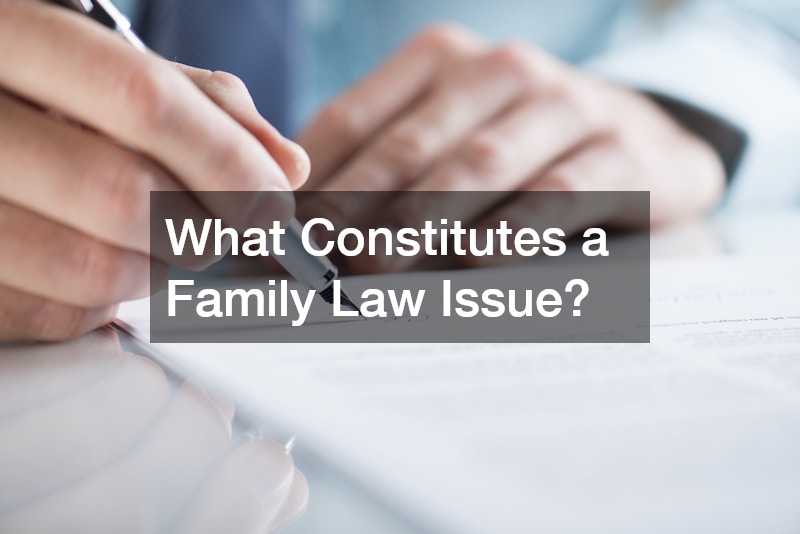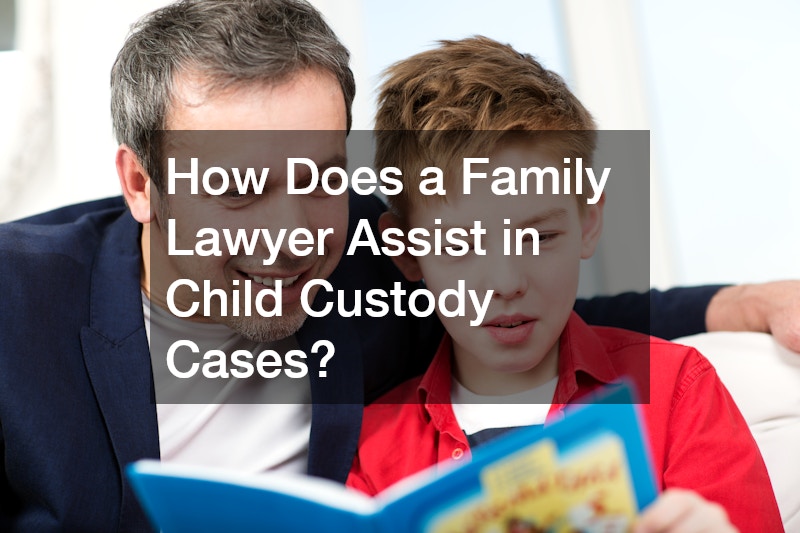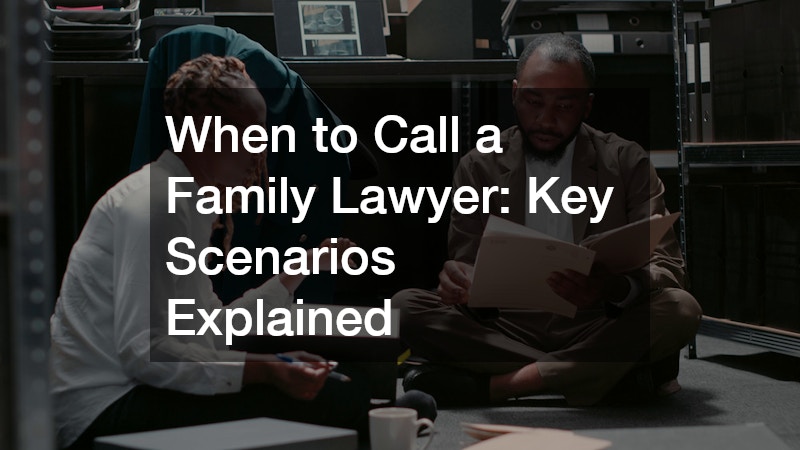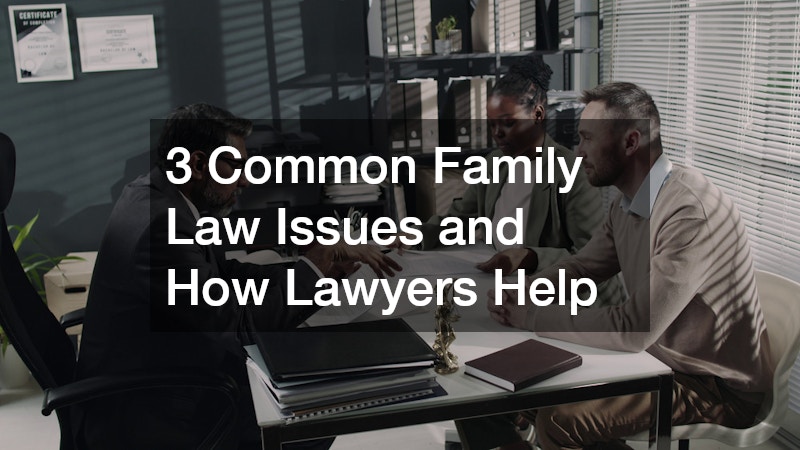Understanding when to seek the guidance of a family lawyer can make an immense difference in navigating the complexities of familial and legal disputes. Many people delay consulting a lawyer because they believe family matters should remain private or that they can resolve issues on their own. However, Australian family law is intricate and often emotionally charged, requiring specialised knowledge and objective advice to ensure all parties’ rights are protected.
This article explains the key scenarios where involving a family lawyer is not just beneficial but often essential. From divorce and child custody to adoption, property settlements, and domestic violence, a family lawyer can help steer your case through the legal system with clarity and confidence. Whether it’s negotiating fair arrangements or representing you in court, their expertise ensures your interests are upheld and that you comply with the relevant laws.
While some people might also turn to other professionals, such as financial advisors for money matters or coaches for hire to help manage life changes, only a qualified family lawyer can provide legally binding solutions in family law. Throughout this article, we’ll also briefly touch on how other legal professionals — like burglary lawyers, criminal defense lawyers, commercial lawyers, and even conveyancing specialists — fit into the broader picture of legal services.
Let’s look at what constitutes a family law issue and when exactly you should call a family lawyer.
What Constitutes a Family Law Issue?

Definition and Scope of Family Law
Family law governs the legal responsibilities between people who share a domestic connection. This includes relationships by blood, marriage, de facto partnership, adoption, or guardianship.
Common Family Law Issues
A family lawyer often handles matters like divorce, child custody, child and spousal support, property settlements, adoption, domestic violence, and guardianship. These cases are sensitive and require a nuanced approach because of the emotions and interpersonal dynamics involved.
Importance of Legal Intervention
Many family law issues can escalate quickly if not addressed properly. Timely legal intervention by an experienced lawyer ensures your rights are protected, and you avoid costly mistakes or unintended outcomes.
Consulting vs. Hiring a Lawyer
Identifying the Need for Legal Advice
There is a difference between consulting a family lawyer for advice and formally hiring one to represent you. Consulting helps you understand your options and potential outcomes. You might only hire when legal documents need drafting, negotiations reach a stalemate, or you are headed to court.
While family law is their domain, other situations — like criminal charges or personal injury — would call for criminal defense lawyers, a local injury law firm, or even burglary lawyers, depending on the case. Similarly, coaches for hire may help with coping strategies, but only a qualified lawyer can offer enforceable legal advice.
When Should You Consult a Family Lawyer for Divorce?
The Initial Decision-Making Process
Divorce is often one of the most challenging decisions in a person’s life. Consulting a family lawyer early ensures you understand the process, timelines, and your rights.
Legal Separation vs. Divorce
A family lawyer can explain whether legal separation or divorce is more suitable in your situation and what each entails under Australian law.
Negotiating Child Custody and Support
Custody and support are usually the most contentious issues. A family lawyer can help draft and negotiate fair arrangements that prioritise the children’s best interests.
Dividing Assets and Debts
Asset division can be complex, especially with shared businesses, investments, or debts. Here, a family lawyer works alongside financial advisors to achieve an equitable outcome.
Handling Spousal Support and Alimony
Understanding whether you are entitled to, or liable for, spousal support is another reason to seek a family lawyer’s expertise.
How Does a Family Lawyer Assist in Child Custody Cases?

Understanding Custody Laws
Child custody laws vary between states and can be difficult to interpret. A family lawyer clarifies your rights and obligations.
Legal Custody vs. Physical Custody
A family lawyer helps differentiate and secure either legal or physical custody, depending on your circumstances.
Negotiating Custody Arrangements
They also help in drafting workable parenting plans that minimise conflict and are legally enforceable.
Modifying Existing Custody Orders
If your situation changes — such as relocation or remarriage — a family lawyer can help modify custody arrangements through the proper legal channels.
Handling Interstate Custody Disputes
Interstate disputes can involve additional legal complexities that a skilled lawyer is equipped to handle.
What Role Does a Family Lawyer Play in Adoption?
Types of Adoption Processes
From stepparent to international adoption, a family lawyer can guide you through the specific procedures and paperwork required.
Legal Requirements and Eligibility
They ensure you meet all legal criteria and help prepare the necessary documents.
International Adoption Considerations
Navigating international adoption laws often requires coordination between jurisdictions, which is where a family lawyer and sometimes a commercial lawyer come in.
Open vs. Closed Adoption
Your family lawyer can explain the pros and cons of both arrangements to help you make an informed decision.
Finalising the Adoption Process
Finally, they represent you in court and ensure the process is completed legally.
When Do You Need a Family Lawyer for a Prenuptial Agreement?
Benefits of a Prenuptial Agreement
A family lawyer can help protect your assets, clarify financial expectations, and reduce conflict in case of separation.
Legal Requirements for Validity
They ensure your agreement complies with Australian law to avoid it being overturned later.
Negotiating Terms of the Agreement
A family lawyer ensures that both parties are treated fairly during negotiations.
Limitations of Prenuptial Agreements
They will also explain what a prenup can and cannot legally enforce.
Postnuptial Agreements as an Alternative
If you’re already married, a family lawyer can draft a postnuptial agreement instead.
How Can a Family Lawyer Help With Domestic Violence Cases?

Recognising Signs of Domestic Violence
Many victims do not realise the extent of their legal rights. A family lawyer can advise you confidentially.
Obtaining Restraining Orders
They assist in filing for and securing protective orders quickly.
Legal Protection for Victims
Beyond immediate safety, they help plan long-term legal strategies, including custody and property rights.
Role in Criminal Proceedings
While a family lawyer handles family aspects, criminal defense lawyers or burglary lawyers may step in for the criminal elements of the case.
Long-Term Legal Solutions
They help secure ongoing protection and navigate property or custody issues post-separation.
Why Is a Lawyer Important in Arranging Child Support?
Calculating Child Support Obligations
A family lawyer ensures the child support amount is fair, reasonable, and accurately reflects the financial circumstances of both parents. They will take into account income, living expenses, and the needs of the children to help determine an appropriate amount that meets legal standards while also being manageable for the paying parent.
Enforcing Child Support Orders
If the other party refuses to pay or continually falls behind, your lawyer can initiate formal enforcement actions through the courts. This could include garnishing wages, seizing tax returns, or even seeking penalties to ensure compliance with the child support order.
Modifying Child Support Agreements
Life circumstances can and do change — such as job loss, remarriage, or changes in the child’s needs. A family lawyer can help you petition the court to adjust your child support obligations legally and fairly, ensuring the arrangement stays appropriate over time.
Interstate Child Support Issues
Moving between Australian states or territories complicates child support arrangements. A lawyer ensures that the agreement remains valid and enforceable in the new jurisdiction and helps you comply with interstate legal procedures without unnecessary stress or confusion.
Dealing With Non-Payment Issues
When child support payments stop altogether, a family lawyer can help you recover unpaid support using all available legal avenues. They’ll also advise you on how to minimise disruptions to your child’s well-being while the matter is resolved.
When Should You Involve a Lawyer in Grandparents’ Rights Cases?
Understanding Grandparents’ Legal Rights
Australian family law recognises certain rights for grandparents, particularly when it comes to maintaining a relationship with their grandchildren. A family lawyer can explain these rights clearly, so you understand what you’re entitled to and how to protect your interests.
Seeking Visitation Rights
If you are being denied access to your grandchildren, a family lawyer can help you apply through the courts for visitation. They will also help you prepare evidence and arguments to demonstrate that ongoing contact is in the child’s best interests.
Filing for Custody as a Grandparent
In circumstances where parents are unable to care for the child — due to incapacity, abuse, or other reasons — grandparents may apply for custody. This is a complex legal process that requires a skilled lawyer to guide you every step of the way.
Legal Challenges and Limitations
While grandparents do have rights, these are not absolute. There are limitations and potential challenges to your application, which your family lawyer will help you anticipate and navigate to strengthen your case.
Navigating the Court System
The court process can be intimidating and confusing. A family lawyer represents you in hearings, handles the legal paperwork, and helps you present your case clearly and effectively to the judge.
How Do Family Lawyers Handle Cases of Child Abduction?
Immediate Legal Actions to Take
If your child is abducted, immediate legal action is critical to ensure their safety and return. A family lawyer can advise you on emergency measures, help file urgent court applications, and coordinate with authorities right away.
International Child Abduction Laws
These cases often involve complex legal issues, especially when the child is taken overseas. International treaties like The Hague Convention govern such cases, and an experienced lawyer is essential in managing them properly.
The Hague Convention and Its Implications
A family lawyer can guide you through The Hague Convention process, which is designed to return abducted children to their country of habitual residence. They will help you understand the treaty’s requirements and limitations and ensure your application is handled efficiently.
Returning Abducted Children
They work closely with Australian and foreign authorities to facilitate your child’s safe and lawful return. This includes filing applications, appearing in hearings, and advocating for your child’s best interests throughout the process.
Preventing Future Abduction Scenarios
To reduce the risk of future abductions, your lawyer can help put preventative legal measures in place — such as court orders restricting travel or mandating supervised contact — tailored to your specific circumstances.
What Is the Family Lawyer’s Role in Guardianship Arrangements?
Understanding Guardianship Types
There are different forms of guardianship — temporary, permanent, or emergency — each with specific legal implications. A family lawyer can explain which type of guardianship applies to your situation and help you make an informed decision.
Establishing Legal Guardianship
A family lawyer assists you in drafting, filing, and submitting the appropriate legal documents to the court to establish guardianship. They’ll also ensure all requirements are met so the process goes smoothly.
Responsibilities of a Legal Guardian
Your family lawyer will clearly explain your legal responsibilities as a guardian, including decision-making authority, financial obligations, and reporting duties. This ensures you understand what is expected and avoid unintentionally breaching your duties.
Guardianship for Minors and Adults
Guardianship may be required for both minor children and incapacitated adults. A family lawyer helps you navigate the different legal frameworks and procedures applicable to each situation.
Terminating or Modifying Guardianship
If circumstances change — such as improvement in the ward’s condition or the need for a new guardian — a family lawyer can assist you in terminating or modifying the guardianship legally and effectively.
How Do Family Lawyers Assist With Property Settlements?

Valuing and Identifying Marital Property
A family lawyer works closely with financial advisors to accurately value and identify all marital property, including real estate, superannuation, businesses, and investments. They ensure nothing is overlooked or undervalued.
Legal Principles of Equitable Distribution
They explain how Australian family law applies to dividing property equitably — which means fairly, though not always equally — and guide you through what to expect during negotiations or court proceedings.
Negotiating Settlement Agreements
Your lawyer acts as your advocate during settlement negotiations, helping to resolve disputes over assets, debts, and property to avoid the time and cost of a trial whenever possible.
Drafting and Approving Settlement Terms
Once a settlement is reached, your family lawyer prepares a legally binding agreement that clearly sets out the terms, protecting you from future disputes or misunderstandings.
Handling Contested Property Disputes
When an agreement cannot be reached amicably, your family lawyer represents you in court and presents evidence to support your claims. They ensure that your interests are robustly defended throughout the litigation process.
Conclusion
Engaging a family lawyer at the right time can make a world of difference in the outcome of your family-related legal matters. Whether you’re facing a divorce, negotiating child custody, drafting a prenuptial agreement, or seeking guardianship, their expertise ensures your interests are protected and your actions remain within the law.
It’s also worth remembering that while family lawyers specialise in these areas, other legal professionals — such as burglary lawyers, criminal defense lawyers, commercial lawyers, and even specialists in conveyancing — may also play a role in your broader legal needs. Likewise, working alongside financial advisors and even coaches for hire can help you plan for the future and manage the emotional aspects of your situation.
Ultimately, knowing when to involve a family lawyer can save you stress, time, and resources. With their support, you can move forward with confidence, secure in the knowledge that your rights and your family’s well-being are safeguarded. Whether you’re planning for the future or responding to a crisis, don’t hesitate to reach out to an experienced lawyer who understands the sensitive nature of family law.

